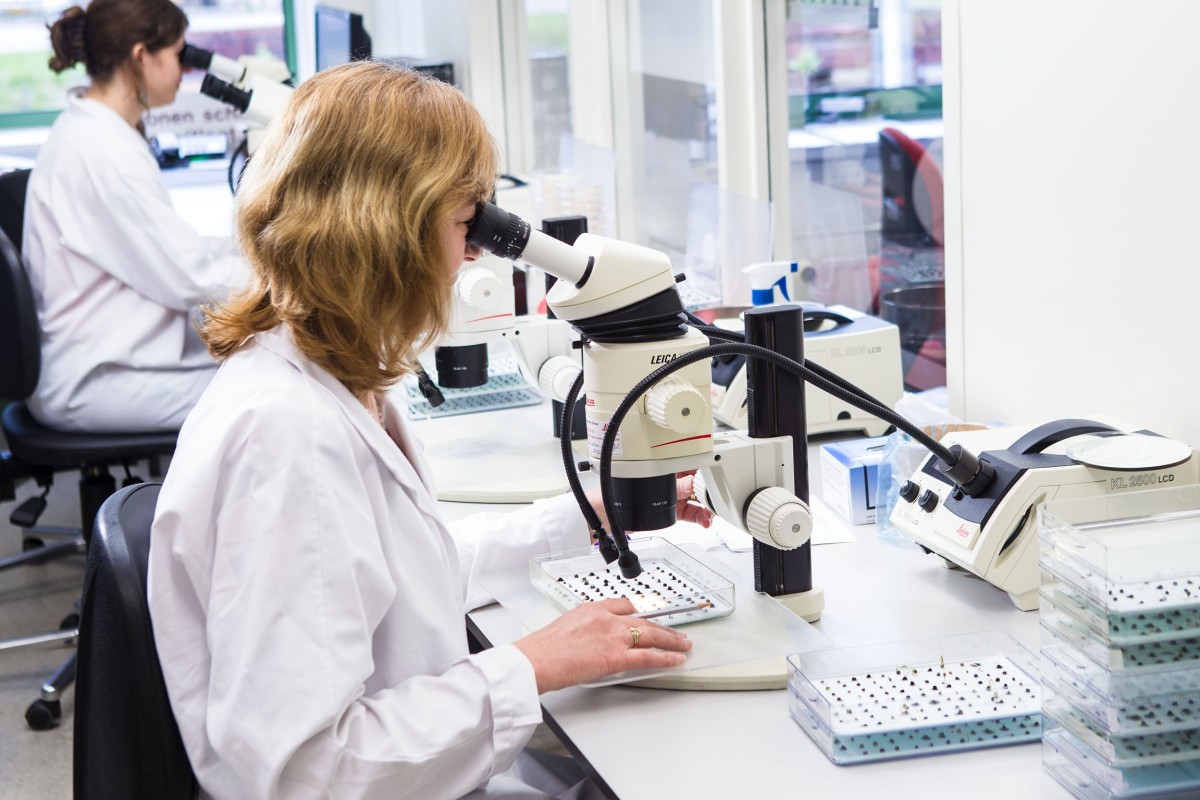
-
Variety Testing
-
Plant Breeders’ Rights and/or listing DUS-VCU
- Breeder's co-trials vegetable crops
- External Crop Experts Ornamental Crops
- Conditions of submitting identity material for DUS testing
- Calibration books Variety Testing
- National protocols Variety Testing
- Procedure of landraces, hobby market and conservation varieties
- American Plant Breeders' Rights - technical testing
- Two tests in one year
- Identity (Variety Tracer)
- Varietal trueness and varietal purity
- Resistance
-
Data of varieties
- Use of a third country synonym for a vegetable variety
- Vegetable-, agricultural- or ornamental crop?
- Authorisation: marketing material of not yet listed varieties
- Internal Naktuinbouw list for vegetable varieties
- List of names of Woody Plants and List of names of Perennials
- OrganicXseeds: database
- Variety descriptions
-
Plant Breeders’ Rights and/or listing DUS-VCU
- Inspections
- Testing & Analyses
- Knowledge & Education
- About us
-
Variety Testing
-
Plant Breeders’ Rights and/or listing DUS-VCU
- Breeder's co-trials vegetable crops
- External Crop Experts Ornamental Crops
- Conditions of submitting identity material for DUS testing
- Calibration books Variety Testing
- National protocols Variety Testing
- Procedure of landraces, hobby market and conservation varieties
- American Plant Breeders' Rights - technical testing
- Two tests in one year
- Identity (Variety Tracer)
- Varietal trueness and varietal purity
- Resistance
-
Data of varieties
- Use of a third country synonym for a vegetable variety
- Vegetable-, agricultural- or ornamental crop?
- Authorisation: marketing material of not yet listed varieties
- Internal Naktuinbouw list for vegetable varieties
- List of names of Woody Plants and List of names of Perennials
- OrganicXseeds: database
- Variety descriptions
-
Plant Breeders’ Rights and/or listing DUS-VCU
- Inspections
- Testing & Analyses
- Knowledge & Education
- About us
Protocols & Guidelines

Protocols
In order to achieve international harmonisation of the testing protocol for the detection of pospiviroids in tomato and sweet pepper seeds, Naktuinbouw makes its protocols available to other parties.
These protocols can be used for detecting CEVd, CLVd, MPVd, PCFVd, PSTVd, TASVd, TCDVd and TPMVd. The protocols were developed in a 3x1000 seed format and are also available in a 50x400 seed format to meet Australian requirements. They involve manual RNA extraction (for sweet pepper seeds) or KingFisher extraction (for tomato seeds). The RT-PCR is based on a combination of a number of multiplex PCRs for detecting eight pospiviroids. The detection of PSTVd-TCDVd is based on the current Naktuinbouw protocol for these viroids, which has been validated. The entire protocol will be validated in the EU-TESTA project.
In addition to these protocols, we also have a compliance available about the testing method used for Clavibacter testing. This statement can be requested by e-mail.
Protocol for Pospiviroïds on tomato seeds Protocol for Pospiviroïds on pepper, eggplant and sticky nightshade-seeds
Frequently asked questions (FAQ)
Where can I register for newsletters?
You can register for our newsletters on our website
Which certifications and accreditations does the Naktuinbouw laboratory hold?
The laboratory has three different certifications/accreditations:
- NEN-EN-ISO 9001:2015
- NEN-EN-ISO/IEC 17025:2017
- ISTA Accreditation
Where can I find your accreditations?
You can find more information about our accreditations on our website.
Can I also have agricultural crops tested with Naktuinbouw?
For agricultural crops, please contact our fellow inspection service NAK in Emmeloord
My results state that my bean sample is overgrown with saprophytes. What can I do?
Leave the lot for a few months, then send a sample again. Saprophytes cannot survive on bean seeds for long.
My results state that my sample is overgrown with saprophytic bacteria or fungi. What does this mean?
Saprophytic bacteria or fungi are harmless organisms that sometimes naturally occur on seeds. If these saprophytes are present in high numbers, this may disturb the culture method. This means there is a considerable risk that an assessment of that test will no longer be possible.
My results state that my tomato sample is overgrown with saprophytes. How is that possible?
Drying after HCl treatment must be done quickly. If the drying process takes too long, the risk of saprophytic bacteria and fungi growing is too high.
Pectinase treatment is also an option. This is faster and reduces the exposure time and the growth of saprophytes.
What does the result 'Follow-up test' on my certificate mean?
The test where this is mentioned is the basic test. Suspicious values were found in this test and a (an additional) validation test was performed. You can find this on the certificate with the same sample, but it states a different technique. The result of this is leading.
There is an incorrect information on my certificate. Can that be adjusted?
Certain amendments can be made after a certificate has been issued. Please send a request to Laboratory Support team: laboratoria@naktuinbouw.nl.
According to our ISO certification, we are obliged to change the version number on the new certificate. It also states which amendments have been made.
When can I expect the results of my test(s)?
The Price list Laboratories 2025 states the duration of the tests. Tests generally start within three weeks of receiving the samples. However, this time may differ if a high number of samples are submitted. MyNaktuinbouw shows the expected end date and any results of your completed test(s).
Can Naktuinbouw issue a NAL certificate?
NAL stands for Naktuinbouw Authorized Laboratory. This means that Naktuinbouw authorises companies to test their own lots of material. The certificates issued by these companies are accepted in the same way as a Naktuinbouw certificate for the purpose of obtaining a phytosanitary certificate.
Naktuinbouw does not issue NAL certificates.
Naktuinbouw only uses functional and analytical cookies. More information